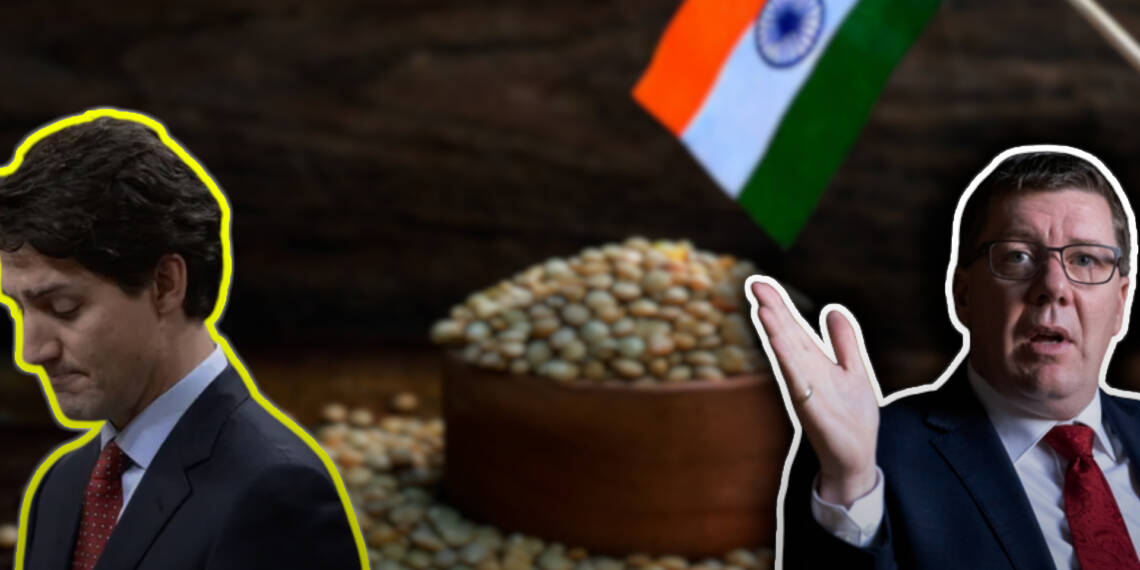Justin Trudeau’s strained relations with India is finally leading to consequences, particularly impacting the Prairies region. The dispute, stemming from the mere killing of Khalistani, is causing repercussions beyond federal losses. The Canadian heartland is set to incur a billion-dollar loss if Trudeau doesn’t back off soon.
Economists specializing in agricultural markets are closely monitoring the escalating diplomatic discord between Prime Minister Justin Trudeau’s administration and India. The focus is on whether this disagreement might escalate into a trade war. India stands as a crucial trading partner for Canada, particularly in pulse crops like lentils.
In 2021, India sourced more than 77% of its dried and shelled lentils from Canada, with agriculturally significant provinces like Saskatchewan annually exporting half of their lentil crops to India.

Frayne Olson, a crops economist and professor at North Dakota State University, emphasizes the potentially devastating impact on Canadian farmers if India engages in a trade war. The stakes are high, given India’s substantial purchase of approximately $1.4 billion Canadian dollars worth of pulses from Canada.
India and Canada’s Agricultural Bond
Roughly 50% of Saskatchewan’s lentil crop is directly shipped to India, underlining the immense significance of this issue for Canadians. Canada holds a significant role in India’s agricultural landscape, primarily as a supplier of two crucial commodities. Firstly, Canada supplies muriate of potash (MOP), the third most consumed fertilizer in India, with substantial imports recorded in recent years.
Provinces like Saskatchewan and Alberta, core agricultural regions in Canada, have benefited greatly from trade with India. Specifically, Saskatchewan, a major exporter, faces significant financial implications if trade relations with India deteriorate further. Saskatchewan’s exports to India consistently rank among the highest, contributing over $1 billion to the provincial economy.
This trade relationship represents 30 to 40 percent of all Canadian trade with India annually.
It isn’t like Trudeau didn’t have an idea that such a consequence could occur. Warnings regarding the escalating India-Canada rift were already issued to the Canadian PM, cautioning about the severe consequences of a potential trade war.

Read More: Canada Set to Lose Est. $50 Billion Due to India’s Sanctions
A $12Bn Suffering: What if a Trade War Erupts
Back in September 2023, renowned Canadian media portals had already highlighted the disproportionate impact on the Canadian economy compared to India’s in case of further escalation. Canada annually exports materials worth $12 billion to India, having redirected trade from China, emphasizing the economic significance.
India already has a large market to rely on other nations, but Canada doesn’t. And so, Canada could easily incur severe losses. Despite these warnings and the need to safeguard Canadian interests for economic growth, political considerations in Ottawa have seemingly overshadowed pragmatic approaches.
In addition, India also holds a crucial role in the Indo-Pacific region, as it is often stressed as a Gateway for the region. So, it is truly unwise for Trudeau to provoke India without considering the consequences. Canada heavily relies on India for agricultural exports, particularly impacting provinces like Saskatchewan and Alberta.
Read More: Jagmeet Singh is burning the bridges between India and Canada
Trudeau should carefully assess the potential repercussions on Canadian agriculture before getting involved in contentious issues. A more considerate approach is essential in handling divisive matters. If India initiates a trade war, Canadian farmers must brace themselves for a significant and harsh impact. Preparedness and strategic planning are crucial in navigating the challenges that might arise.
Watch More:
https://youtu.be/fRZQpYe68yQ?si=lduxbpr5h2V4-IKc








